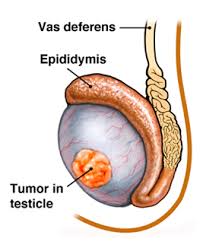
- Call : + 07523 300822
- Email : team@herefordshireurology.co.uk

Testicular Cancer
 Although fortunately rare, testicular cancer is one of the commonest cancers to affect young men. The commonest types of testicular cancer are called Germ Cell Tumours, they are rare before puberty and most commonly occur in men aged 20-40.
Although fortunately rare, testicular cancer is one of the commonest cancers to affect young men. The commonest types of testicular cancer are called Germ Cell Tumours, they are rare before puberty and most commonly occur in men aged 20-40.
Most testicular cancers are easily felt, this is why it is important to perform regular testicular self examination. The best time is usually after a warm bath or shower; the muscles in the scrotal wall are relaxed making it easy to feel the testicle. Testicular self examination is particularly important in those who have, or have had an undescended testicle , this is an important risk factor for testicular cancer. It is relatively rare for testicular tumours to cause pain. There are many alternative possible causes for pain and swelling of the testicle, an ultrasound scan is often used to discriminate between these conditions.
If you are concerned about the possibility of a testicular cancer, the best approach is to discuss this with your doctor.
Treatment usually involves radical orchidectomy (surgery to remove the testicle through a groin incision) and then referral to a specialist centre for consideration of chemotherapy, radiotherapy, further surgery or occasionally just observation. Cure rates using these treatments are very high with over 90% of patients with germ cell tumours cured.
Testicular pain
Testicular pain may be acute (short history) or chronic (longer term problem).
Infections, twisting of the testicle (torsion), trauma and rarely cancer can cause acute pain. All these conditions require treatment and some should be seen either urgently or if the pain is very sudden onset or severe (which may be a twisted testicle) as an emergency.
Chronic testicular pain is pain that continues for a few months or more. This is very common and can be caused by testicular swelling (for example hydrocoele, varicocoele, post vasectomy swelling or cysts), testicular inflammation or rarely testicular cancer. Sometimes there may be a non-testicular reason for the pain, such as hernia, prostatitis, kidney stones or even back problems. Often it can be difficult to know for certain the exact cause of the pain.
Treatment depends upon the exact cause of the pain, an ultrasound scan is requested and blood and urine tests are performed to make a diagnosis. Acute testicular pain may need urgent surgery if there is a suspicion of tumour or torsion. Antibiotics, painkillers rest and a scrotal support usually cure an acute testicular infection (epididymo-orchitis).
Chronic pain may be improved by surgery- if there is an underlying problem. However it is more difficult to treat chronic pain and sometimes after ruling out serious pathology it may be that living with the pain with the help of pain killers is best.
Mr Christian Nayar often treats men with testicular pain and can advise you on the best management strategy.
Testicular swellings
Testicular swellings are common, there are many potential causes, but the most important one to rule out is testicular cancer. Other causes include:
All men should examine their testicles regularly, to check for new swellings. The best time to examine is usually after a warm bath or shower. If a new swelling is detected it is advisable to discuss the problem with a doctor. Examination alone is often sufficient to diagnose the problem, however, if there is any doubt an ultrasound scan is simple to perform and often provides reassurance.
Testicular swellings often do not require treatment as long as there is no suspicion of testicular cancer or hernia. However if the swelling is very large or uncomfortable, surgery or other treatment may be offered, depending upon the condition. Mr Christian Nayar will be able to advise you on the best treatment following a clinical assessment.